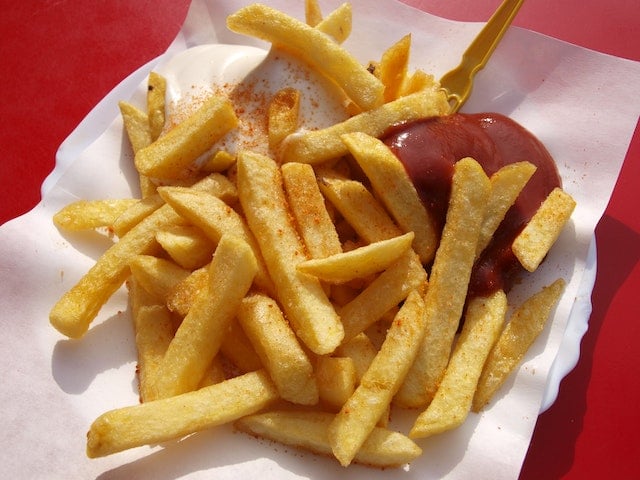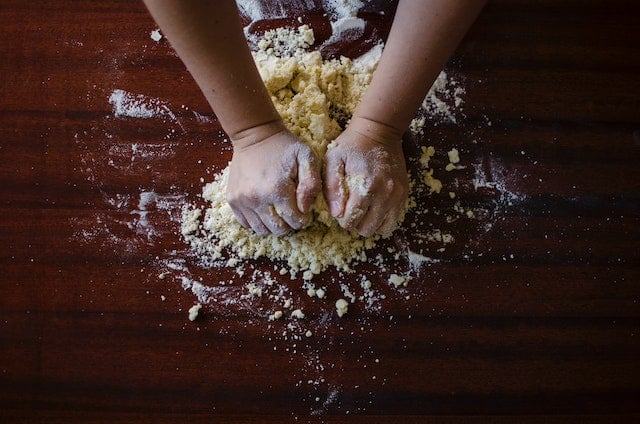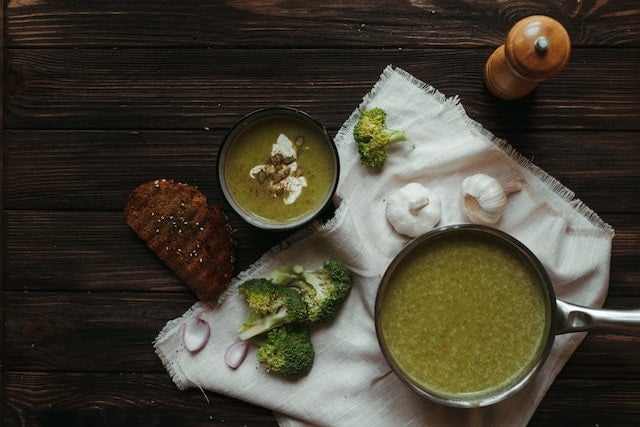A Taste of Italian: 30 Italian Cooking Phrases
Food has a remarkable way of connecting us with the essence of a place. As you try traditional dishes from other countries, food becomes a portal to another culture, a bridge between languages and lifestyles.
When you cook Italian food, you’re not just learning a language; you’re immersing yourself in it. You’re using it to create something tangible, something delicious. This fusion of learning and doing makes the Italian cooking phrases you encounter more than just linguistic constructs; they become a part of your culinary repertoire, forever etched in your memory.
Whether you’re a novice in the kitchen or a seasoned chef, the Italian cooking phrases below will help you prepare mouthwatering dishes while enhancing your Italian language skills.
Buon appetito!
→Sign Up Now: Free Trial Italian Lesson With a Native Teacher!←
10 Essential Italian Verbs for Cooking
Imagine finding the recipe to your childhood’s favourite dish in your old grandma’s cookery book. Wouldn’t it be nice to decipher the stained instructions without having to resort to a translation app?
In this section, we’ve compiled a list of 10 basic Italian verbs for cooking that will help you prepare your favourite dishes with confidence and authenticity.
1. Cucinare (Cook)
This versatile verb encompasses the act of cooking in its various forms, whether it’s sautéing, frying, baking, or simmering.
Sample Phrase: “Cucina il risotto fino a quando il riso è al dente.” (Cook the risotto until the rice is al dente.)
2. Friggere (Fry)
Friggere specifically refers to the process of frying food in hot oil until it becomes crispy and golden brown.
Sample Phrase: “Friggi le patate fino a quando sono croccanti.” (Fry the potatoes until they are crispy.)

3. Arrostire (Roast)
This verb signifies the method of cooking food by dry heat in an oven or over an open flame, often resulting in a flavorful, browned exterior.
Sample Phrase: “Arrosta il pollo con erbe aromatiche per un sapore ricco.” (Roast the chicken with aromatic herbs for a rich flavor.)
4. Cuocere al Vapore (Steam)
This Italian cooking phrase means cooking food by exposing it to steam, a gentle and healthy cooking method that retains nutrients and flavors.
Sample Phrase: “Cuoci al vapore le verdure per una preparazione leggera.” (Steam the vegetables for a light preparation.)
5. Bollire (Boil)
Bollire refers to the process of cooking food in boiling water or liquid until it becomes tender.
Sample Phrase: “Bollisci le uova per 10 minuti per ottenere uova sode.” (Boil the eggs for 10 minutes to get hard-boiled eggs.)
6. Soffriggere (Sauté)
Soffriggere involves quickly cooking food in a small amount of oil or butter over high heat, often for the purpose of browning and adding flavor.
Sample Phrase: “Soffriggi le cipolle fino a quando diventano trasparenti.” (Sauté the onions until they become translucent.)
7. Mescolare (Stir)
Mescolare is the act of gently mixing ingredients in a circular motion to ensure even distribution and prevent sticking or burning.
Sample Phrase: “Mescola la crema pasticcera continuamente per evitare grumi.” (Stir the pastry cream continuously to avoid lumps.)
8. Grigliare (Grill)
Grigliare involves cooking food over an open flame or on a grill, imparting a distinctive smoky flavor.
Sample Phrase: “Griglia le salsicce alla brace.” (Grill the sausages over charcoal.)
9. Marinare (Marinate)
Marinare means to soak food, typically meat, in a flavorful liquid (marinade) to enhance its taste and tenderness.
Sample Phrase: “Marina il pollo in vino e erbe aromatiche per almeno due ore.” (Marinate the chicken in wine and herbs for at least two hours.)
10. Impastare (Knead)
Impastare involves working dough by pressing, folding, and stretching to develop gluten and achieve the desired texture in baked goods.
Sample Phrase: “Impasta la pasta per la pizza fino a ottenere una consistenza elastica.” (Knead the pizza dough until it reaches an elastic consistency.)

More Italian Words Related to Cooking
In this section, we’ll dive deeper into the world of Italian culinary language.
Whether you’re exploring ingredients, familiarizing yourself with essential utensils, or mastering key adjectives to describe cooking stages and expected results, this linguistic journey will enhance your ability to converse and cook like a true Italian.
Ingredients
11. Farina (Flour)
Farina is a fundamental ingredient in Italian cooking, used in making pasta, bread, and various baked goods.
Sample Phrase: “Per fare la pizza, avrai bisogno di farina, acqua, e lievito.” (To make pizza, you’ll need flour, water, and yeast.)
12. Pomodoro (Tomato)
Pomodoro is a staple ingredient in Italian cuisine, used to make sauces, soups, and salads.
Sample Phrase: “Gli spaghetti al pomodoro sono un piatto classico italiano.” (Spaghetti with tomato sauce is a classic Italian dish.)
13. Olio d’Oliva (Olive Oil)
Olio d’oliva is the heart of Italian cooking, employed for sautéing, dressing salads, and drizzling over finished dishes.
Sample Phrase: “Condisci l’insalata con olio d’oliva extravergine per un tocco di freschezza.” (Dress the salad with extra virgin olive oil for a touch of freshness.)
14. Aglio (Garlic)
Aglio is a flavor enhancer used in various Italian dishes, adding depth and aroma.
Sample Phrase: “Soffriggi l’aglio nell’olio d’oliva prima di aggiungere i pomodori.” (Sauté the garlic in olive oil before adding the tomatoes.)
15. Basilico (Basil)
Basilico is an aromatic herb that plays a prominent role in Italian cuisine, especially in pesto sauce.
Sample Phrase: “Il pesto è fatto con basilico fresco, pinoli, e formaggio.” (Pesto is made with fresh basil, pine nuts, and cheese.)
16. Formaggio (Cheese)
Formaggio is a key ingredient in Italian cooking, used to add flavor and texture to dishes. From creamy mozzarella to sharp Parmigiano-Reggiano, this versatile food is an essential part of the Italian kitchen.
Sample Phrase: “Glignocchi al formaggio sono un piatto delizioso.” (Cheese gnocchi is a delicious dish.)
17. Sale (Salt)
Sale is a fundamental ingredient of many Italian dishes and brings out the flavor of other ingredients.
Sample Phrase: “Per insaporire il risotto, aggiungi un pizzico di sale.” (To flavor the risotto, add a pinch of salt.)
18. Pepe (Pepper)
Pepe is a popular seasoning in Italian cuisine, used to enhance the flavor of savory dishes.
Sample Phrase: “Aggiungi un po’ di pepe nero macinato per dare più sapore alla salsa.” (Add a bit of freshly ground black pepper to give the sauce more flavor.)
Utensils:
19. Padella (Frying Pan)
A padella is a versatile kitchen tool used for sautéing, frying, and making omelettes.
Sample Phrase: “Scalda la padella prima di cuocere le uova.” (Heat the frying pan before cooking the eggs.)
20. Casseruola (Saucepan)
A casseruola is essential for simmering sauces, soups, and stews.
Sample Phrase: “Prepara una deliziosa zuppa in questa casseruola.” (Prepare a delicious soup in this saucepan.)

21. Coltello da Cucina (Chef’s Knife)
Il coltello da cucina is a sharp tool used for chopping, slicing, and dicing ingredients.
Sample Phrase: “Un buon coltello da cucina è fondamentale per tagliare le verdure.” (A good chef’s knife is essential for cutting vegetables.)
22. Mestolo (Ladle)
Il mestolo is used for serving soups, stews, and sauces.
Sample Phrase: “Usa il mestolo per servire la zuppa calda.” (Use the ladle to serve the hot soup.)
23. Ciotola (Bowl)
Una ciotola is a container used for mixing, holding ingredients, or serving dishes like pasta and salads.
Sample Phrase: “Mescola gli ingredienti nella ciotola grande.” (Mix the ingredients in the large bowl.)
Adjectives:
24. Croccante (Crispy)
Croccante describes the texture of food when it’s cooked to be crunchy or crispy.
Sample Phrase: “I biscotti sono dorati e croccanti.” (The cookies are golden and crispy.)
25. Saporito (Flavorful)
Saporito indicates that a dish is rich and full of delicious flavors.
Sample Phrase: “Questa zuppa è davvero saporita grazie alle erbe aromatiche.” (This soup is really flavorful thanks to the aromatic herbs.)
26. Al Dente (To the Tooth)
Al dente describes pasta that is cooked to be firm to the bite, not overly soft.
Sample Phrase: “Cuoci gli spaghetti al dente per ottenere la giusta consistenza.” (Cook the spaghetti al dente to achieve the right texture.)
27. Leggero (Light)
Leggero refers to a dish that is not heavy or overly rich.
Sample Phrase: “Questo piatto di pesce è leggero e salutare.” (This seafood dish is light and healthy.)
28. Piccante (Spicy)
Piccante describes food that has a hot or spicy flavor due to the presence of chili or pepper.
Sample Phrase: “Le pizze sono deliziose, ma alcune sono molto piccanti.” (The pizzas are delicious, but some are very spicy.)
Beyond Italian Cooking Phrases: Learn Italian with Language Trainers
The Italian words related to cooking in this article are just a taste of the rich language of Italian cuisine. As you delve deeper into the art of cooking in Italian, you’ll uncover a world of culinary and linguistic delights, each word and phrase adding a dash of authenticity to your culinary creations.
However, to truly elevate your language skills and immerse yourself in the beauty of cooking in Italian, we strongly suggest complementing your cookery sessions with a tailor-made Italian course with us at Language Trainers.
→Sign Up Now: Free Trial Italian Lesson With a Native Teacher!←
Whether you choose to embark on this linguistic adventure solo or with a partner or friend, our flexible scheduling options make it convenient to learn at your own pace, at a time and place that suits you. Plus, we offer in-person Italian lessons in Toronto and every major city in Canada so you can study Italian face-to-face without leaving your house.
So, why wait? Join us on this delectable journey of language and gastronomy and unlock a world of possibilities that extends far beyond the kitchen. Contact us now and get a free trial Italian lesson!
